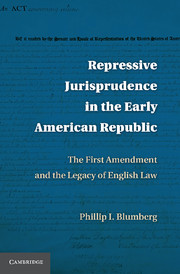 Repressive Jurisprudence in the Early American Republic
Repressive Jurisprudence in the Early American Republic Book contents
- Frontmatter
- Contents
- Acknowledgments
- 1 Political and Jurisprudential Worlds in Conflict in the New Republic
- 2 Politics in the New Republic
- 3 Criminal Libel in the Colonies, the States, and the Early Republic During the Washington Administration
- 4 Federalist Partisan Use of Criminal and Seditious Libel – Statutory and Common Law – During the Tumultuous Adams Administration
- 5 Criminal Libel During the Jefferson and Madison Administrations, 1800–1816
- 6 Partisan Prosecutions for Criminal Libel in the State Courts: Federalists Against Republicans, Republicans Against Federalists, and Republicans Against Dissident Republicans in Struggles for Party Control
- 7 Established Jurisprudential Doctrines (Other than Criminal Libel) Available in the New Republic for Suppression of Anti-Establishment Speech
- 8 Still Other 19th-Century Doctrines for Suppression of Anti-Establishment Speech: The Law of Blasphemy and the Slave State Anti-Abolition Statutes
- 9 Conclusion
- Table of Cases
- Index
4 - Federalist Partisan Use of Criminal and Seditious Libel – Statutory and Common Law – During the Tumultuous Adams Administration
Published online by Cambridge University Press: 05 October 2010
- Frontmatter
- Contents
- Acknowledgments
- 1 Political and Jurisprudential Worlds in Conflict in the New Republic
- 2 Politics in the New Republic
- 3 Criminal Libel in the Colonies, the States, and the Early Republic During the Washington Administration
- 4 Federalist Partisan Use of Criminal and Seditious Libel – Statutory and Common Law – During the Tumultuous Adams Administration
- 5 Criminal Libel During the Jefferson and Madison Administrations, 1800–1816
- 6 Partisan Prosecutions for Criminal Libel in the State Courts: Federalists Against Republicans, Republicans Against Federalists, and Republicans Against Dissident Republicans in Struggles for Party Control
- 7 Established Jurisprudential Doctrines (Other than Criminal Libel) Available in the New Republic for Suppression of Anti-Establishment Speech
- 8 Still Other 19th-Century Doctrines for Suppression of Anti-Establishment Speech: The Law of Blasphemy and the Slave State Anti-Abolition Statutes
- 9 Conclusion
- Table of Cases
- Index
Summary
Collapse of Relations with the French, the Adams Administration Preparing for the Imminent Outbreak of War, and the Bitter Political Climate in the Spring of 1798
For almost two decades after the American Revolution, American relations with the French were very friendly. The two countries were allies by treaty and by national sentiment. After all, French financial support during the dark days of the struggle against Britain and French military and naval power, so prominent in the decisive victory at Yorktown, had been indispensable elements in the American triumph. This warmth began to disappear with the excesses of the French Revolution and the execution of King Louis XVI. Except for Republican zealots such as Jefferson, most Americans were profoundly disturbed by the continuing French excesses. Still, when Citizen Genet, the new French Minister, arrived in Charleston in 1793, relations were still friendly, and Genet received a warm welcome.
The climate soon changed. With France and Great Britain engaged in allout war, the French Navy commenced seizing American ships on suspicion of trading with Britain. The XYZ Affair involving Talleyrand's apparent solicitation of bribes was viewed as intolerable blackmail and had a “stunning” effect on American public opinion. Matters grew worse when Talleyrand and the Directory refused to receive new American diplomatic representatives. Further, Genet's increasingly intolerable conduct, climaxed by the outfitting of French privateers in American ports and his meddling in American politics with appeals to the American people over the head of President Washington, combined with continuing French seizures of American shipping and seamen at sea to bring matters to a head.
- Type
- Chapter
- Information
- Repressive Jurisprudence in the Early American RepublicThe First Amendment and the Legacy of English Law, pp. 72 - 147Publisher: Cambridge University PressPrint publication year: 2010


